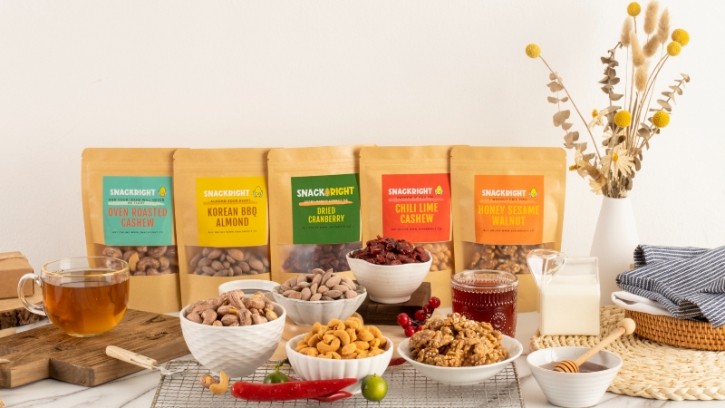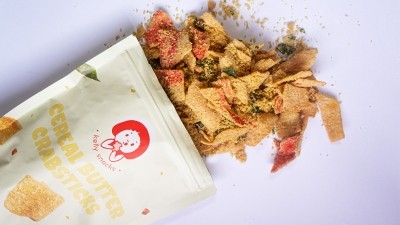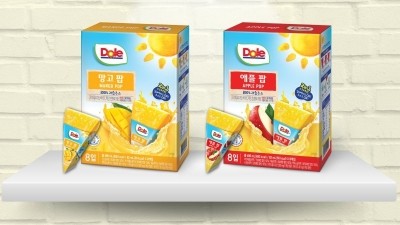Singapore’s SnackRight prioritises boosting of product shelf-life to better appeal to major retailers

The company is working with various retailers in Singapore to extend its reach on the mass market. Its products are currently available on its website, and local e-commerce platforms like Shopee and Lazada.
“The current shelf life of our products is about six months. We are looking to improve that — such as adding nitrogen and aluminium foil into the packaging — so that we can have them in more retail outlets like FairPrice Finest and Cold Storage. This is our goal for 2023.
“At the same time, we want to ensure that our products are always fresh and that they are moving off the shelves. Thus, we will make adjustments based on the demand,” Jit Yen Chan, co-founder of SnackRight, told FoodNavigator-Asia.
In Malaysia, the firm is concentrating efforts on the physical retail sector, including pop-up stores. It is also eyeing consumers with active lifestyles as its target audience.
“Due to COVID-19, a lot of people started working out and became more health-conscious. They are going for sugar-free protein products, and yet also prefer food that is tasty. This is precisely how we have positioned our brand — snacks that can be enjoyed without feeling guilty,” said Chan.
Careful steps
Despite recognising an increased health consciousness among consumers, SnackRight is taking a cautious approach when it comes to expansion.
“We do have plans to export to more markets, but not at this point in time. We are open to any opportunities or distributors who are interested in our products, but our attention for now is on our existing markets. We are playing it safe because of the looming global recession,” Chan explained.
The firm’s production house is located in Malaysia mainly because of the lower costs compared to Singapore.
“It’s all about identifying the type of cost that generates more return on investment (ROI). A lot of companies are cutting costs amid economic uncertainties — for example, corporate partners that stock our products in their pantries are also reducing their budget.
“This is a challenge for us, but as a small and medium-sized enterprise (SME), we are more flexible than multinational corporations (MNCs) in adapting to constantly changing situations. We used to plan [the business] on a yearly basis, but now, we look at the numbers and react accordingly,” Chan shared.
Nuts about flavours
Among its line-up of roasted nuts, dried fruits and multigrain rice crackers, SnackRight’s best-selling product in both Singapore and Malaysia is the Chilli Lime Cashew.
“The combination of mild spiciness and tanginess gives off a distinctly Asian flavour. It is a showstopper. Whenever people try it, they would straightaway get it. Many of our customers in Singapore told us that the taste is similar to the chilli sauce that is typically paired with Hainanese chicken rice,” said Chan.
Other flavours that are also performing well include Honey Sesame Walnut and Korean BBQ Almond
“A lot of people dislike walnuts because its skin contains tannins, which have a naturally bitter taste, so we use honey and sesame to balance the flavours. On the other hand, the Korean BBQ Almond is very popular among male customers as it goes well with beer.”
In terms of sales volume, Chan revealed that the figures in Singapore and Kuala Lumpur are close.
“Our products are available in other parts of Malaysia, such as Penang, so I would say the sales volume there is slightly more. However, the Singapore market is also doing well because the spending power [of local consumers] is very high,” she added.
In addition, the company has an in-house R&D team that is continuously cooking up new flavours, with the aim of launching new SKUs every six months.
“Most of our ideas come from day-to-day life. For example, we are working on a new product called Caramel Macadamia, which is inspired by popcorn. During festive seasons like Christmas and Chinese New Year, we will release some special flavours that are sold for a limited period.
“While we try our best to introduce new products regularly, it also depends on R&D outcomes. We don’t want to push out products that don’t suit consumers’ taste buds. Having our own production house helps to maintain product quality, which consumers will be able to tell when they eat our snacks, such as the freshness and crunch in every bite,” Chan said.





















